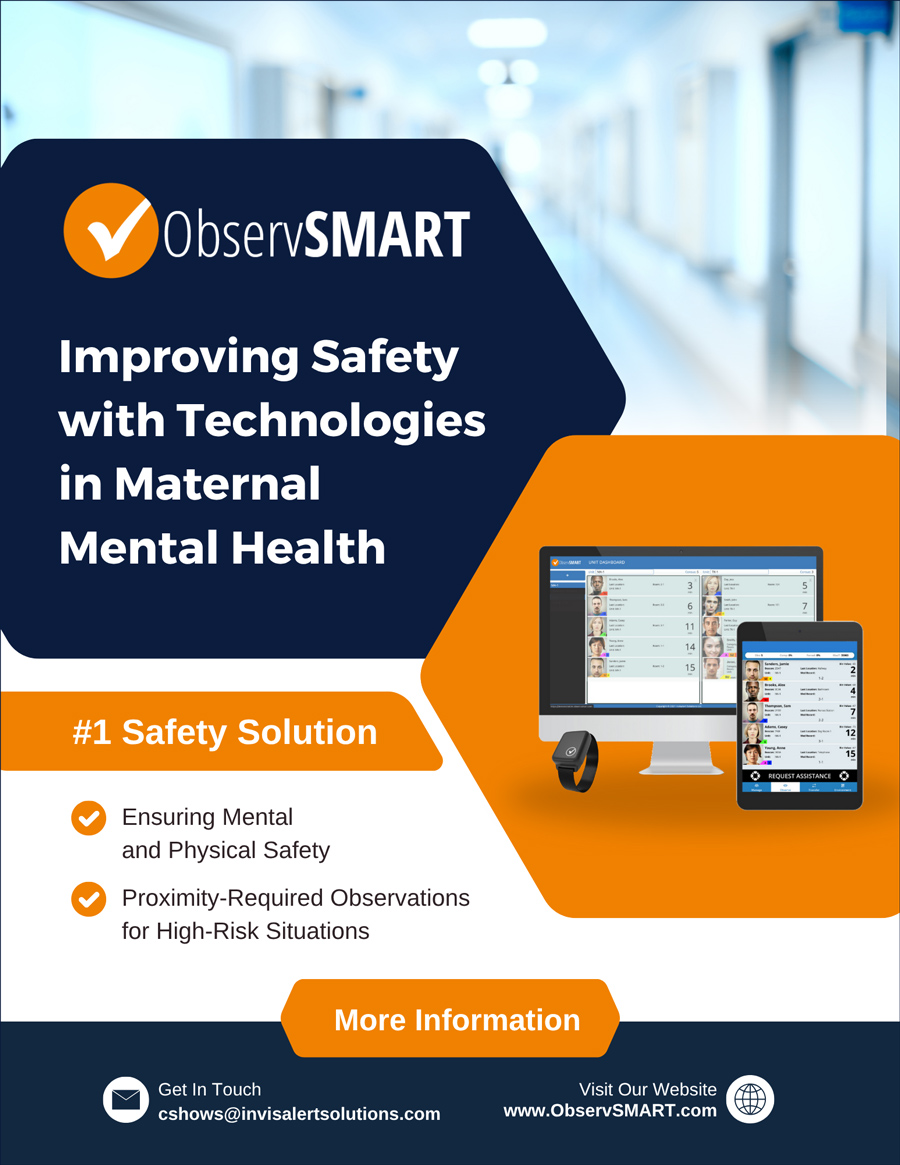Maternal mental health is increasingly recognized as a cornerstone of family well-being and a critical area for innovation in modern healthcare. Each year, thousands of women experience perinatal mood and anxiety disorders (PMADs), including postpartum depression, anxiety, and postpartum psychosis. These conditions don’t just affect mothers- they can influence infant development, partner relationships, and long-term family dynamics.

While healthcare staff have long focused on the physical aspects of childbirth, the mental health component is gaining long-overdue attention. As healthcare systems seek to provide more modern maternal care, data-driven tools and hospital safety technologies are playing an expanding role in identifying risk, supporting early intervention, and improving outcomes.
Understanding the Scope of Maternal Mental Health
According to the Centers for Disease Control and Prevention (CDC, 2024), about 1 in 8 women with a recent birth report experiencing symptoms of postpartum depression. While postpartum depression is the most discussed, conditions range from generalized anxiety and obsessive-compulsive behaviors to more acute disorders like postpartum psychosis. Postpartum psychosis requires immediate clinical attention due to its severity and potential risks to both the mother and infant (ACOG, 2023a; 2023b).
Left untreated, these conditions can significantly impact a mother’s ability to bond with her infant, increase the risk of complications like substance misuse or suicide, and create long-term developmental risks for children. Early detection and proactive, compassionate intervention are vital.
Ensuring Mental and Physical Safety in Postpartum Care
Physical health and mental health are deeply interconnected, particularly in the postpartum period. Women recovering from childbirth often deal with fatigue, pain, and hormonal fluctuations that increase both the risk of emotional distress and physical accidents, such as falls.
Innovative safety technologies originally developed for psychiatric and high-risk units are now being adapted to support postpartum care. SMARTsense, a sensor-based monitoring system, detects patient movements like getting out of bed or entering the bathroom. The system alerts staff to movement that may signal a fall risk, especially important at night or for mothers recovering from cesarean sections. All accomplished without using intrusive cameras,
For patients navigating both physical recovery and PMAD symptoms, this kind of discrete, non-invasive monitoring is more than a safety measure. It promotes privacy, dignity, and swift staff response – all of which can reduce stress, anxiety, and support emotional recovery.
Real-Time Observations for High-Risk Situations
In critical cases, mothers may enter a mental health crisis during or after childbirth. Conditions like postpartum psychosis require urgent, around-the-clock monitoring to ensure the safety of the mother and her infant.
Here, technologies such as ObservSMART360 provide real-time patient observation and alerts. This system gives you access to patient location, monitors for unsafe behaviors like elopement or aggression, and alerts supervisors for a prompt, immediate staff response when someone enters restricted areas or demonstrates high-risk behaviors.
Though ObservSMART was not originally designed for maternity units, its use in the mental health and behavioral care settings has direct applications in postpartum safety. Hospitals can apply similar tools to ensure timely intervention for mothers exhibiting symptoms of acute distress, delusion, or disorientation.
Standardizing Care with Protocol-Based Support
Consistency is key when managing complex conditions like PMADs, especially across different shifts and staffing levels. The Protocols application enhances hospital workflows by embedding prompts and reminders into the care routine, ensuring that mental health screenings, fall risk assessments, and behavioral observations aren’t skipped or delayed.
These checklists are particularly useful in postpartum units, where the line between physical recovery and psychological need is often blurred. By managing healthcare compliance and alerting nurse managers to deviations or delays, Protocols supports early action and reinforces a culture of accountability and comprehensive care.
Combining Behavioral Data with Dashboard Insights
The potential to integrate safety technologies like ObservSMART, 360, SMARTsense, and protocols with maternal health dashboards is an exciting frontier. By feeding real-time behavioral observations into predictive systems, hospitals can develop a data-driven view of each patient’s risk profile.
Imagine a dashboard that not only notes a mother’s reported mood, but also includes sleep disruptions detected by sensors, missed meals, or pacing behaviors – all possible early indicators of postpartum anxiety or depression. These nuanced signals, often missed in routine assessments, could trigger early outreach from mental health staff or social workers.
Such integration aligns with the broader goal of proactive rather than reactive care, addressing maternal mental health needs before symptoms escalate into emergencies.
Looking Ahead: A Smarter, Safer Postpartum Future
Maternal mental health is not a niche concern – it’s central to the health of families and communities. As awareness of PMADs continues to grow, so does the opportunity for healthcare innovation. Data dashboards, predictive analytics, and integrated safety technologies represent a new frontier in postpartum care – one that is smart, safer, and more attuned to the full spectrum of maternal needs.
While platforms like ObservSMART, 360, SMARTsense, and Protocols may have originated in behavioral and psychiatric units, their capabilities are increasingly relevant in acute care, including maternity care. When combined with thoughtful protocols and compassionate human interaction, these tools can transform how we support mothers, helping to identify mental health challenges earlier and respond more effectively to promote healing.
For additional information or questions regarding this topic, visit www.observsmart.com.
References
American College of Obstetricians and Gynecologists (ACOG). (2023a). Screening and Diagnosis of Mental Health Conditions During Pregnancy and Postpartum. https://www.acog.org/clinical/clinical-guidance/clinical-practice-guideline/articles/2023/06/screening-and-diagnosis-of-mental-health-conditions-during-pregnancy-and-postpartum
American College of Obstetricians and Gynecologists (ACOG). (2023b). Treatment and Management of Mental Health Conditions During Pregnancy and Postpartum. https://www.acog.org/clinical/clinical-guidance/clinical-practice-guideline/articles/2023/06/treatment-and-management-of-mental-health-conditions-during-pregnancy-and-postpartum
Centers for Disease Control and Prevention (CDC). (2024). Symptoms of Depressions Among Women. https://www.cdc.gov/reproductive-health/depression/







